J A Bayona interview: directing Jurassic World: Fallen Kingdom
J A Bayona chats to us about directing the Jurassic World sequel, The Orphanage, and a different way forward for Jurassic Park.
There are perhaps mild spoilers in here, although we’ve redacted anything we considered spoiler-y about the film. However, if you like to go and watch films knowing as little as possible about them, it might be an idea to save this interview until after you’ve watched the movie.
A posh hotel suite in London is as good a place as any to be weary. JA Bayona, the director of Jurassic World: Fallen Kingdom, does seem weary. It’s around 5pm and we’re not his last interview of the day. Then there’s making the movie itself, a feat not long behind him.
“I finished the movie like two weeks ago and I live in Barcelona, so I moved back to Barcelona” he tells Den of Geek as we settle down into a chair that makes an awkward squeak whenever you move.
The Spanish director is now on the road promoting the blockbuster film, a large promotional tour organised around its staggered international release dates (the film hits UK screens on 6th June, a couple of weeks ahead of its US release). While we’re big fans of A Monster Calls, we had dinosaur business to address with the director and so we hope you’ll excuse our lack of conversational diversions.
Here’s how we got on with JA Bayona…
When did you sign on to direct? I understand that a film like this is a massive time commitment.
I think it was about, I think I’ve been involved for less than two years.
And when you signed on you knew it was an almost two year time commitment?
Yeah, we have a schedule. From the moment you have a release date you have a schedule very well defined.
What state was is it in when you signed on? Was there a script?
Yeah, yeah, there was a script and I had a first conversation with Colin Trevorrow. The first thing that he told me was that he thought about me because of The Orphanage, and I was very surprised about it and I was very intrigued. And then he told me that story, that the second half would play more like a haunted house movie. I fell in love with that idea.
And you have a lot of gothic imagery and that score, too. But it’s a departure for Jurassic Park, just from the imagery and the soundscape…
It feels like new, but at the same time it’s pretty faithful to what we’ve seen so far. If you think about the first Jurassic Park, you have the massive set piece of the T-Rex at the centre, but then it gets more claustrophobic and tight in the second half, and you have those scenes of suspense with the velociraptors in the kitchen. It’s kind of the same architecture that we’re following in this one.
I think the biggest change we’re doing here is how we turn this moral tale, because I always think about the Jurassic stories as moral tales, they always talk about the relation that man has toward science, but always blaming man and the bad use of science and never blaming the science. So I always think about the Jurassic stories as moral tales, but in this case the moral tale turns into more a fairy tale in the second. You can find elements of a fairy tale; you have a castle with a princess and a dragon. And I love that idea. I fell in love with that idea. It’s something refreshing and new.
Everyone is expecting to be more scared with a Jurassic movie, but at the same time it’s faithful to what we’ve seen so far in the saga.
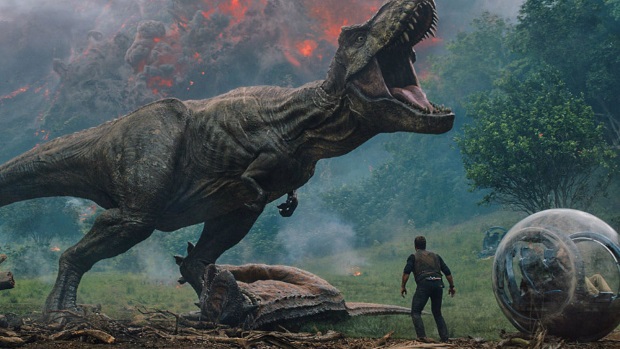
One of the things that’s interesting about Jurassic Park, regarding sequels, is that everyone’s ideas of the series, really, seems to be formed by the first movie and by Jurassic World, which is quite similar to the first movie. So does that give you a certain amount of freedom to try new stuff in this one? Because you can’t just do another theme park again.
Exactly. I think from the moment that we [redacted for spoilers] it’s a statement. It’s a way of telling the people forget about the past, we’re gonna face the future, and the future is not gonna look like anything we’ve seen before. And that’s very interesting. I think it’s very exciting the way Jurassic World 2 finishes. Hopefully it leaves the audience wanting more.
It is. It’s a really interesting ending. I know that Colin’s directing the third one. Have you had discussions with him about it at all?
Not discussions in depth. I know that there are some elements in the story in the second movie that are there thinking about the third movie. So, from time to time Colin came to me and said ‘Can you please put that line… Can you please refer this thing in that moment…’ because he was already thinking about the third episode.
Can you tell me then about balancing, because there are a few different voices in this film. As the director you’re an authorial voice, and then there’s the screenwriting team (Colin Trevorrow and Derek Connolly), there’s a studio with an eye on the franchise going forward. Is it tough to balance all of those different voices and still tell your story?
I think in these movies you have a voice, which is Steven Spielberg. I think he created the franchise, he supervised all the movies and he is, all the time, supervising the biggest decisions, the most important decisions. We’re always taking consideration of that.
I think somehow he set up the tone and the mood, and for me that was the reference. Expanding the story that he did in the first movie. I was doing Jurassic World 2 but I was also doing Jurassic Park 5. And in that sense, Colin and I would talk, we were close in the story and close in the scenes and there was also a moment where we thought ‘What would Steven think about this?’ I think that, you don’t want to change the whole thing, you don’t want to change the mood, you just want to make the best Jurassic movie possible.
One of the things that’s really interesting in the film is, it’s a massive scale production, but it is very contained, it does get more claustrophobic. But the trend among a lot of modern blockbuster films is bigger, bigger, bigger. Did you feel any pressure to go the other way with it?
Not at all. Something that we discussed with Colin was that we had to go smaller, I said claustrophobic, tighter. But that’s the only way to go from [spoilers]. I think the movie somehow delivers what people want to see in the first section. So we go to the island and we lead a huge adventure, a massive adventure there, you have all the fireworks in the first half of the movie, and in the second half you start to feel the tension in a different, more suspenseful way. This is when we start to get into the horror section of the movie. I think it works very well. That’s something that’s in the first movie, it’s not something that we invented. We all remember the horror scenes in the first Jurassic Park, with the velociraptors in the kitchen. So that’s what we’re doing in this one.
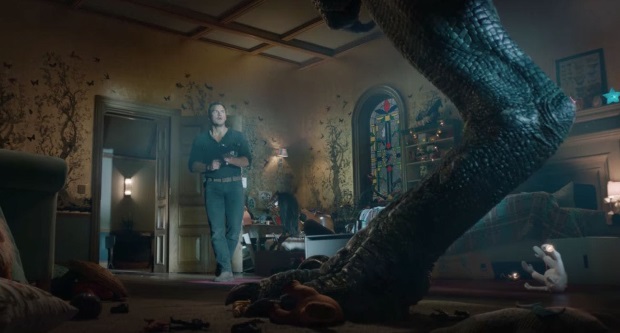
Really, the first 10 minutes feels very Spielberg and you have horror in that. There’s also some fantastic underwater stuff, which is really inventive. Can you tell me about shooting the underwater scenes? I imagine that’s incredibly difficult.
That was already on the page, starting the movie underwater. I think that was very exciting. We’ve never been there in a Jurassic movie. But then I asked Colin to really push for it, like creating a massive, a bigger set piece at the beginning. We’ve never seen such a big scene to start a Jurassic movie and I thought that, we had a lot of exposition after that so I thought let’s bring the audience like a full piece of excitement here, a massive set piece that they’ve never seen before, not in a Jurassic movie. And then we get into the moment that we set up the story before getting to the island.
Pacing wise, after that scene the setting up is really brief. It’s very pacey. Was that always the case? You always knew that you wanted to get going quickly?
Yeah, you cannot stop in these movies. For me it was an exercise in intensity, I really wanted to have a very intense movie. A movie where you can have a lot of fun, this is the first time I did comedy and I really enjoyed that, but at the same time having a non-stop sense of action. We talked to Steven and Steven was always encouraging us for doing so, for not stopping the action at any moment.
I actually did want to ask you about the comedy stuff, because your previous films were generally quite sober affairs. Were you confident you’d be able to pull those scenes off?
Yeah, it’s one of the reasons I wanted to be involved. I love the sense of comedy you can find in some of Steven’s movies, and I’m thinking about Jurassic Park but I’m also thinking about Raiders Of The Lost Ark, Indiana Jones. There is this kind of visceral comedy, kind of slapstick, that reminds me a lot of silent movies. So in that sense I started to watch a lot of silent movies, Buster Keaton movies and movies like that in order to get inspiration. There is a moment that I love in the set piece of the volcano, where the characters hide behind a long log, and the log is being destroyed by dinosaurs. That felt like one of those slapstick moments, like a silent comedy moment.
And you couldn’t have had a better star for that, because Chris Pratt is a very, very good physical comedian.
Yeah, he’s an amazing actor. He’s a lot of fun, we had a lot of fun on set, but he’s also very serious about work. And he’s brilliant. Every time we had a scene, we would talk about it for a long time, try to do the best of every single moment. He had amazing ideas, I just love to hear Chris. A lot of his ideas were taken into consideration and we put them in the film.
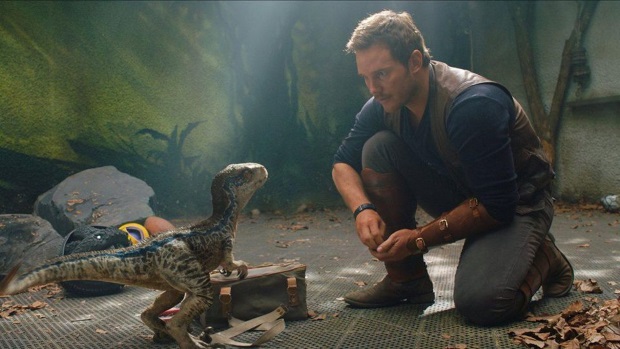
The thing I really enjoyed about this film, the way you constructed your action sequences, they’re so entertaining. The constant haystacking, where the characters will achieve something but then it causes something else to go wrong. Can you tell me how you break down your action scenes?
I think for me, the whole thing is based upon designing the scenes shot-by-shot. Nowadays there’s so many coverage (shots) when you see action movies and you can tell that they were shot with four or five cameras at the same time and I’m not interested in shooting a movie like that because for me the whole film is a choreography, and the way the camera moves and the way the actors move inside the frame provokes an emotional impact on the audience. So it’s all about designing, shot-by-shot and the way you show the elements inside the shot is very emotional. For me that’s the way storytelling works.
And one of the other things I really like is there’s a clarity, you can always see what’s happening.
Exactly, yeah.
There are a lot of wide shots, it’s so exciting to watch. So, I’m guessing this early in you haven’t had a chance to see it with an audience?
We had the chance two days ago in Madrid, in the world premiere and it was perfect. The audience reacted so well and we had a great, warm welcome. And you know, these movies are made to be enjoyed with more people in the room. I had a lot of fun, especially in the last section of the movie when the whole thing turns into this horror film. It was a lot of fun.
There are some horror elements in it, as you’ve said and as there should well be for a Jurassic Park movie. Especially as you’ve made The Orphanage which is decidedly not a family movie, was it easy to adjust the intensity for a film that children will want to see?
I think because you have four movies before you know what is the DNA of the franchise, where are the red lines, and in that sense we were pushing the movie one step forward but knowing where the red lines were. That’s easy to do because you’ve seen these movie, we love these movies, we know what is the right thing to do and the wrong thing to do.
For me, that was the most challenging thing about working in a sequel, to find the element of surprise. You know, giving the audience what they want but also what they don’t expect.
I have to say, it’s not what I had expected at all and part of that, I think, is because they’ve done a good job of concealing what’s in the film. I know that secrecy is a big deal with these films. I don’t know how involved you are in trailer construction…
Not at all. No. I am involved in all the pieces that were sent to us, but it’s such a big machinery.
Is that interesting to you, to see what they put in and what they don’t?
Yeah, but it’s kind of… These movies are, you’re doing the film, you’re working the story, but then there’s a whole section of people, a lot of people working on the marketing campaign and the release of the movie and I really didn’t want to be that much involved in it. Because (laughs), I had to do the film, you know?
Yeah, I guess that’s not been the case on your previous films.
No, but the previous films were independent productions, so basically we did everything. But this was totally different.
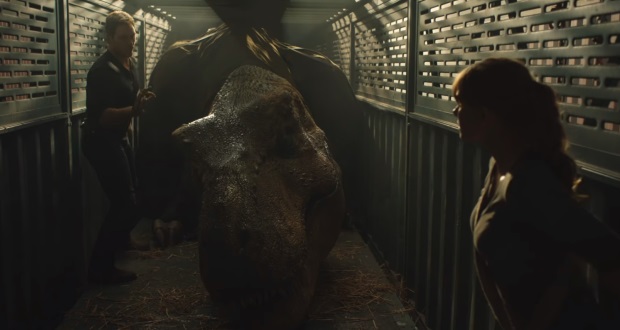
Has it been fun to see toys of your movie?
Sure, it’s great. It’s the first time I deal with all the fans, with this kind of fan phenomena, and it’s exciting, it’s great, to see that everything you do, everything you say, there are so many people waiting for it, it’s even more exciting.
One of the things that’s different in this film is the character Claire, played by Dallas Bryce Howard. It feels like she’s been worked on a little bit. Was that the case? Can you tell me a little about the process of adjusting that character?
Well, I think it’s very interesting when you start to work on a sequel because you normally, as a director, have to work the relationship between the actors, but in this case we already had a background so that was done. That was great.
But then you need to find the position where you find them, at the beginning of Fallen Kingdom, and that was very exciting that you don’t see them together any more. So there’s something that happened in the past, and also you take the relationship to a more mature place. You don’t focus on if they’re gonna be together or not. It’s a different place, you know?
Of course, there was a lot of criticism on the first movie, and we all were very aware of it. But, for me, it was natural thing to give more to the character of Claire because all my movies, I always had a female character in the centre. So for me it was the most natural thing to do, focus on Claire at the same level that Owen.
A film that I felt like I saw, that was part of Claire, was Aliens. I felt like maybe there was some of that in there. Was that one of the films you referenced on this?
Well, I love Aliens. You can tell because I worked with Sigourney in the previous movie. I really love Aliens, but I’m not sure if I’m referring to that movie especially. Like, for example, I agree with James Cameron when he says that sometimes a movie just gets better by changing the genre of the main character. Sometimes, just replacing the lead character for a woman instead of a man, suddenly the story gets better.
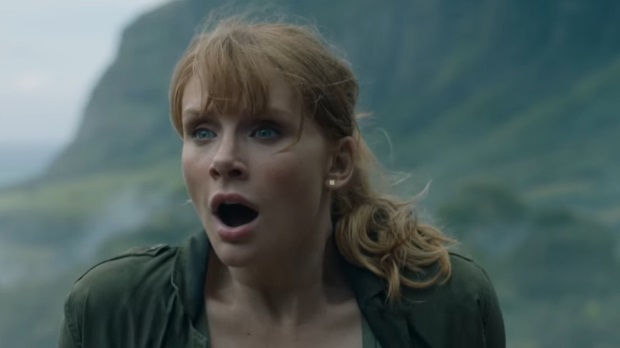
An actor who I think puts in a great performance who I hadn’t even realised was in this movie is Ted Levine.
Yeah.
Can you tell me a little bit about working with him? I love Ted Levine.
He’s an amazing actor. I love to work with him.
He came with this idea of creating this kind of military man. He just wanted to portray the most hateable character possible. He wanted someone who really deserved [spoiler], you know? And he was so creative on set, trying to give ideas, bringing story notes to make this character more and more hateable. And I really enjoyed working with him. He’s one of those actors that, when you put the camera in front of him, it’s so impressive what you get only by the look that he has. I really, really enjoyed working with him.
Do you have any idea of what you’re going to be moving on to after this? Other than presumably about 18 months of press.
(Laughs) Not really. Because it’s been so hard working on this one, I couldn’t have much time to think about it. I’m developing a couple of projects right now but I haven’t taken a decision yet.
Do you anticipate it being of a similar scale?
No, no, no. Right now, what I’m thinking is a much smaller film. But still, I haven’t taken a decision yet.
JA Bayona, thank you very much!
Jurassic World: Fallen Kingdom is in UK cinemas from June 6th.